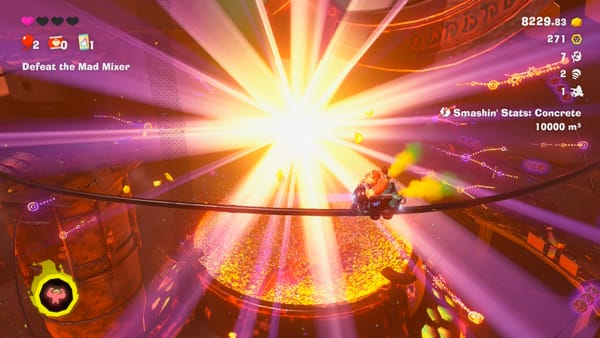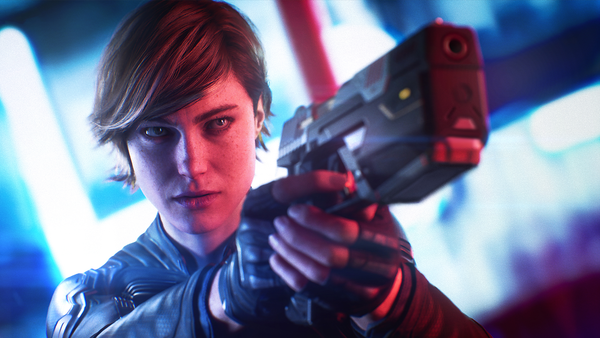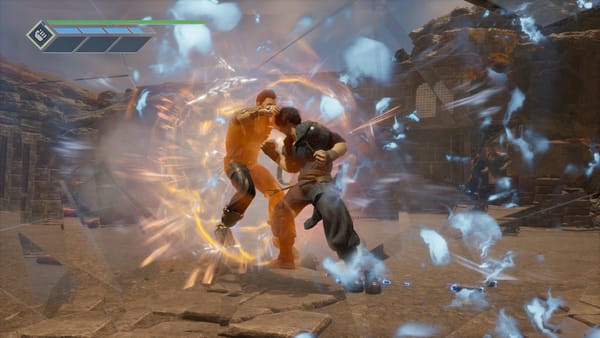#116: Crouch end
Sony is insisting developers create demos for new PlayStation games. Are intros about to get fun again?
[Thanks for reading Hit Points! If this is your first time, then a hearty welcome to you. If you enjoy today’s edition, note that you can sign up for free to get this twice-weekly look at the latest goings on in the game industry sent straight to your inbox. It also gets you access to the full Hit Points archive. Thanks, and enjoy!]
Earlier this week I wrote about a new Apple policy, under which any game that hasn’t been updated in a number of years faces deletion from the App Store. I said this:
“I am incredibly queasy at the thought of platform-level policy decisions impacting on, or even dictating, the evolution of game design.”
I shall now, just three days later, disagree with myself completely.
Since Tuesday’s Hit Points, reports have emerged that Sony is mandating that any game releasing on PlayStation Store, with a price of $34 or more, must offer a trial version to users on the highest tier of the new-look PlayStation Plus. Trials must be at least two hours in length, be made available within three months of a game’s launch, and remain available for at least a year. Sony did not, apparently, communicate this to partners ahead of time.
On first inspection this seemed quite worrying. For one thing it appears to punish games with slender runtimes, though I imagine the minimum-price component will be a pretty effective workaround for that. And it seemed a bit rum that Sony was adding to developers’ already hefty workloads by insisting they make trial versions — but sources have told Kotaku reporter Ethan Gach that the PlayStation Store team will create the demos, so I suppose that’s okay. (Gach’s sources also expressed reservations about Sony monetising developers’ work without sharing any of the revenue. I must admit I do not have a counterargument to that.)
But! Could this, in fact, be A Good Thing? The other day I feared that Apple’s platform policies were nudging game developers in a worrying direction by looking more kindly upon a certain style of game. Here I think Sony could be nudging the triple-A bods in a good direction, by making sure that the first two hours of their game are actually, well, you know. Fun.
Let us conduct a brief thought experiment. Think about the last few big-budget, full-price games you bought on day one. Now imagine that, before you bought them, you could have played the first two hours of them for free. How many of those games, on the basis of their first two hours, would you then have gone on to buy? Elden Ring, yep. Anything else?
Thought not.
Back in my Edge days I became increasingly aware of a phenomenon I called The Phone Test. It was a measure of how quickly it took me, after sitting down with some much-hyped new open-worlder or whatever, to look away from the screen and reach for my phone. (The record holder, Marvel’s Spider-Man, lasted just four minutes.) Whatever the style, setting or genre, the opening hours of just about every triple-A game these days are functionally identical.
Ah, cutscenes, is it? Righto. A bit of a slow walk, perhaps some chats with friendly NPCs, to further establish the story and the stakes? A tutorial dressed up as a campaign mission, designed to breadcrumb out the controller layout? Gotcha. It’s L2 to aim, is it? And R2 to… yes, thought so. Wait! How am I to fit under this low beam? My character is clearly too tall!
And so on.
I of course understand why big games are designed this way. Say the last Assassin’s Creed sold eight million, and the higher-ups have projected ten million for the new instalment. Implicit in this calculation is the fact that at least two million of your intended players will either never have played an Assassin’s Creed game before, or have not played one in a while. Besides, there’s a new historical setting, a new story and a new protagonist or two, so you might as well get all that stuff established while teaching players the basics. Might as well take your time, eh, to really make sure they understand what they’re doing and how to do it. Besides, the consultants said good onboarding was critical (sorry about that), and Twitter really goes after this stuff these days (again, my apologies).
This line of thinking is, I reckon, in part a legacy of the 360 era, when the industry was obsessed with ‘keeping the disc in the tray’. Publishers were so paranoid about the impact on revenues of the second-hand market — and believed there was no greater threat of a game going on the player’s trade-in pile than them getting stuck or confused — that tutorials effectively began to be measured in hours, and triple-A games decided to hold our hand from the moment we sat down until the credits had rolled. That philosophy has endured to today, when engagement and retention are vital in lots of ways, not least maximising opportunities for monetisation. I understand where it comes from, sure, but look: it’s rubbish and I hate it, and I reckon the vast majority of day-one game purchasers are the same.
So I wonder how the triple-A landscape might be transformed were developers suddenly encouraged to design the beginnings of their games with fun at absolute top of mind. What if the first two hours of a game were designed to sell players on a concept, rather than assuming they were already bought into it? Might be interesting to find out, that. Finally, perhaps, a reason to get excited about Nu-PS Plus. Better late than never, I suppose.
MAILBAG!
You’ve gone quiet, you lot. Leave a comment or hit reply and let’s get this back up and running.
MORE!
- Yuji Naka has issued a sensational statement about the development of Balan Wonderworld, the roughshod action-platformer he directed for Square Enix. Naka says he was arbitrarily removed as director — a move he took the publisher to court over — and that the game was released unfinished despite his protests. “I believe that it is a true disgrace that Balan Wonderworld was released in the state that it was in,” he said, according to a VGC translation. “I believe that Square Enix and Arzest are companies that care about neither games nor their fans.” Fuck about.
- Twitch is considering a raft of policy changes, the dumbest of which is a reduction in the revenue share offered to top streamers from the current 70% to a 50:50 split. The Amazon-owned platform reckons this will raise profits by nudging streamers into showing more ads; it also risks nudging streamers right off the platform, if you ask me, but I suppose that’s why they don’t pay me the big bucks.
- Activision Blizzard shareholders have overwhelmingly voted in favour of Microsoft’s proposed acquisition of the scandal-mired publisher. I mean, you would, wouldn’t you. Wall Street seems unconvinced that the deal will succeed, however.
- UK energy supplier British Gas has urged customers to turn off “vampire” consoles, rather than keeping them in standby, to offset surging energy prices. Could it be that rapacious profiteering is pushing millions into fuel poverty amidst the greatest cost-of-living crisis in decades? No. It’s the Xbox that is wrong.
- Reggie Fils-Aimé loves the blockchain, because of course he does. “There’s some games I’ve invested 300 hours in. And when I’m ready to move on to something else, wouldn’t it be great to monetise what I’ve built?” Reggie Fils-Détesté, more like.
There you go! Gosh, this has been a week. A month, actually. And now I think of it, a bit of a year. But this week in particular. As ever, if you’ve enjoyed this, do give it a share; it really does help enormously. Have an excellent weekend — mine will involve Switch Sports, Kaiju Wars, Rogue Legacy 2 and Knotwords, and slightly too much wine — and enjoy your Monday off if you’re in the UK. Catch you all next week.





